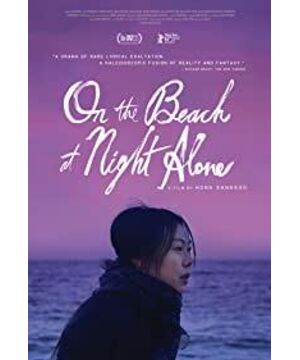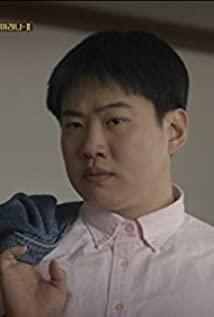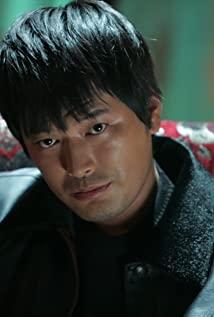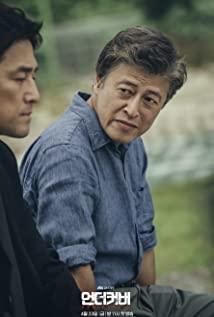Each piece of art has its own unique vitality. From the moment it is completed, it is separated from the creator and exists as an independent personality. Therefore, it is necessary to connect "The Seaside" with the unrelated love between director Hong Sang-soo and actor Kim Min-hee. An ill-advised interpretation, like tying a Van Gogh painting to a prostitute he loved, or tying a Picasso figure with the name of his mistress, will only lead us to a dead end.
As an amateur film lover, for me, movies are mostly two functions, sensory pleasure, and enlightenment to life. I don't get much of either of those in Seaside.
Because the film has a high degree of closure, that is, it is difficult for the film to be extended to real life. The audience has the right to watch and think, but not to participate. The simplest example of those films with a low degree of closure is "Forrest Gump", which promotes a universal view that can easily be brought into the real thing, and exists depending on the audience. There is a classic question in the art world: if the audience does not exist, the art does not exist? "Forrest Gump" is yes, "The Seaside" is no. "Beach" only tells a story in the director's heart, which is private and personal. It does not accept the audience's arbitrary appropriation of himself, and there is no big reason to be squeezed out of it.
I felt like the man in the hat the whole time, desperately trying to dry the windows and see what the movie characters were doing, but it was all in vain, the windows were there and I would never be able to enter their world. After the man in the hat cleaned the window, he smoked a cigarette on the balcony leisurely. What a writer like me who racked his brains to write a high-level film review, always trying to get some insights from the scene in the mirror. The director anticipated all this, and then mocked it.
This is a story about loneliness. The director's loneliness and the heroine Young-hee's loneliness also reflect my loneliness as a moviegoer. Loneliness is a closed circle, no one enters, and it becomes the closure of the film itself.
The scene that struck me the most in the film was when Young-hee shouted out to her friends her understanding of love. She accused others of being "unqualified to be loved", not "true love", but only alive, because they were all "satisfied with lies" and playing the game of love. In real life, this kind of frankness is rare, because calling a friend a hypocrite in this way can only be exchanged for being splashed with water by the friend, or the friend turns away, and the relationship ends. Therefore, the plot of the film is surreal, and the friends in the film are unusually calm, and I don't know if they have listened to what Young Hee said. I can't help but think, why did the director arrange the plot like this? Who is the real audience of Young-hee's words?
In an interview with Hong Sang-soo, the interviewer said: "The film critic Jean-Michel Fu Dong once said that the most outstanding thing about your films is 'honesty'. It is completely different from the candidness of self-confession, Your film is surprisingly candid. Waiting and waiting knowing there is nothing to be done, but not so, Young-hee yelling at the hypocrites, like a desperate attempt to see people as they are."
I absolutely love this one The interviewer's interpretation of this episode, because Young Hee's words shouted to my heart. The hypocrites are not only the very calm friends in the film, but also the audience in front of the screen. Young-hee's words caused mottled ripples in my heart, making me trace back to my original appearance. I used to tell a lie. Thanks to Hong Sang-soo's feminist portrayal, it turns out that a frank woman can face others with such dignity and confidence.
Let’s talk about the unusual calmness of those friends. In the whole film, except for Young Hee and Young Hee's dream director, all the supporting characters are like an unbreakable wall. The emotional value of the supporting characters has always been stable, and the whole process is very "kind".
As an amateur film lover, I always look forward to some traditional movie storylines, such as Young-hee's male senior making a sexual invitation to her, and the female senior mocking her infidelity. In the end, none of this existed. These friends, familiar or unfamiliar, all supported Young-hee unconditionally, tolerated her petty temper, and praised her "sincerely". I see part of their perspective, part of their way of life, but I don't see all of them as they really are. In other words, they both have a lot of stories buried behind them, like Young Hee, but the director refused to let me see behind them. For example, the female senior who kissed Young-hee, I don't know whether she wanted to be Young-hee's manager because of her financial constraints and wanted to go back to Seoul, or because she really appreciated Young-hee's talent and wanted to help her out of the predicament? Another example is a male senior who doesn't want to admit his girlfriend. Did he ever have a love relationship with Young-hee? Did he still try to have an affair with Young-hee so he didn't admit his current girlfriend, or he just didn't want to admit his existing relationship? ? Judging from the limited clues in the film, these possibilities are all established.
These invisible friends once again highlighted Young Hee's loneliness. Although he has received so much love and tolerance on the surface, he can't get into other people's hearts (or Yingxi doesn't want to). Young-hee's relationship with her friends also reflects my social relationships. People who have walked in my world, I believe that every word they say is sincere. Sincere, but covered with window paper, can not be pierced. Sometimes how I wish they could also have an emotional outburst like Young Hee and let me see what the hell is behind the window paper. But is what you shout out to be true? "Reality" is not a black-and-white concept, but is conveyed in depth. The sincere company of friends to Yingxi cannot heal her loneliness. As shown in the film, the bond between people is well established on the surface and at a superficial level, but deep inside it is like an island. It seems that Yingxi is a victim of loneliness and desperately needs redemption, but when people gather together, who fills whose boring time and who comforts whose loneliness.
Is love really the most important thing to Young Hee? It seems that he is thinking about that man every minute, but Yingxi's dream gives us a more real answer. Many juniors appeared in the dream, and they were full of praise for Yingxi. It seems that Young Hee quit her job and wants to sort out the context of love, but in fact career and love are tied together. In the subconscious, Young Hee not only wants to get a lover, but also wants to become a successful actor and a handsome senior. Anxiety about love is the expectation and fear of career and the future. This is also a question about the simplicity of love. The human heart is not pure, and how can love exist in an environment of pure oxygen. It is an obsession mixed with various desires of the human heart.
Hong Sang-soo is a proponent of postmodernism, where truth does not exist, only opinions exist. The director in Young-hee's dream read a passage of Chekhov's "About Love". There is a passage that has not been read out, but it is the subject of Hong Sang-soo's filming: "So far, there is only one sentence about love that can be regarded as an irrefutable truth: 'This is a great secret', as for other people's concerns about love. What love writes and speaks is not an answer, but raises a question that has not yet been resolved. An explanation seems to be suitable for one situation, but not for ten others, depending on the In my opinion, it is best to explain each situation separately and not to generalize."
As Chekhov said, Hong Sangxiu does not convey a universal view, the whole film is just his self-talk, listen to it if you like it. If you don't like it, just leave, so it's back to the issue of film closure. "Beach" can't be the answer to love and loneliness for anyone other than Hong Sangxiu, but fortunately it raises questions and waits for those who resonate to think.
The above film reviews are just my fragmentary insights, just like the fragmented plots of the film. The possibility of "The Seaside" is actually greater. It can be a delicious main course on the academic table. Whether its anti-linear narrative, postmodernist frame, or questioning the boundary between film and reality, it can make scholars talk about it. , this will be a piece of film history. On a personal level, it allows me to see myself wrapped in glass.
View more about On the Beach at Night Alone reviews











